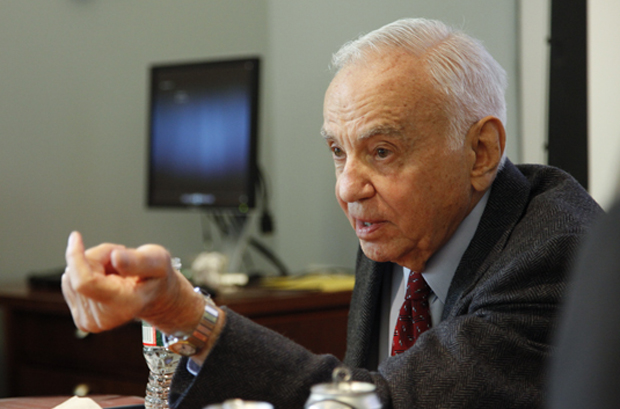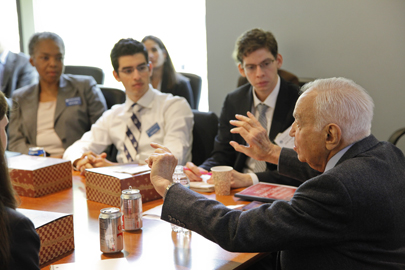Mort Mandel talks about doing good, doing well
In new book, philanthropist says it's all about who you hire and how they lead
 Photos/Mike Lovett
Photos/Mike LovettIf it weren’t for his unmistakable gravitas, you might think on first meeting that Morton L. Mandel is laid back, or that he looks at the world through rose-colored glasses.
Ask him the three most important things people should know about him. His eyes twinkle and he shoots back “name, rank and serial number” in a heartbeat. Persist, and he’ll talk about the importance in his life of his mother, his brothers and his wife.
That part is no joke. Mandel, one of the most successful American business entrepreneurs of the mid-to-late 20th century, gives most of the credit for how he and his brothers turned a $900 auto-parts business into a $3 billion multinational electronics corporation to the high quality of personal relations and ethical values in his family.
How those values have played out in his career – guiding everything from hiring and firing, to objecting to segregation in Mississippi in the 1940s, to declining to do business with Bernie Madoff in the 1990s – is laid out in Mandel’s new book, “It’s All About Who.” Publication date is Dec. 18, but the book’s already available on Amazon and, Mandel adds, eyes twinkling again, “it’s already marked down.”
The Mandels are among Brandeis’ most generous supporters. Mort (whose daughter Amy graduated Brandeis in 1973), his brothers Jack and Joe and his wife, Barbara, who is a longtime Brandeis trustee, gave $22.5 million five years ago to create the Mandel Center for the Humanities, within which their family foundation continues to support numerous initiatives, fellowships and programs.
They previously had created the Mandel Center for Studies in Jewish Education and made other significant contributions in support of the humanities. The Mandel Foundation also has given $18 million to create the Jack, Joseph and Morton Mandel School for Advanced Studies in the Humanities at Hebrew University, in Jerusalem.
Mort Mandel is passionate about everything he does – otherwise he just doesn’t bother – and that is particularly evident when he talks, in the language of business, about investing in the humanities.
|
Mandel with students in the International Business School. |
“I am concerned about the lack of civility, the lack of involvement, that people don’t vote and don’t work for candidates,” he said in a recent interview, echoing his remarks at the groundbreaking for the spectacular Brandeis humanities building. “I think people should not consider themselves college graduates unless they have the intellectual tools to function responsibly as citizens in a free society. There aren’t just opportunities for college graduates, there are obligations. The reason we’re investing in the humanities is to tilt the college experience more toward that idea.”
Noting that only 6 or 7 percent of undergraduates today are humanities majors – down from about 17 percent when he was in school – Mandel said the situation in Israel is even worse. “There,” he said, “you can get a degree in your specialty -- medicine, law, engineering, anything you want -- and take zero hours in the humanities.”
So when the $18 million grant for the Mandel School at Hebrew University was under discussion, Mandel and Jehuda Reinharz, who has been president of the Mandel Foundation since resigning the Brandeis presidency two years ago, persuaded the Jerusalem institution to require students there to take at least two courses in the humanities.
Mandel is unabashedly proud to be a significant philanthropist, but he does not like to talk about it in terms of “gifts” or “donations.” To him, the money is an investment in changing the world for the better. Slender, vigorous and healthy at 91 – a condition he attributes jointly to good genes and a personal trainer he calls Satan -- he gets personally involved in his investments, whether they are in the for-profit or non-profit enterprises.
Mandel has been deeply engaged with the United Way and the Jewish Community Centers Association (JCCA) on management as well as funding matters. Among the major themes of his book are that the for-profit and non-profit world each have lessons to teach the other and that principles of good management are applicable in both sectors.
He’s come to Brandeis several times recently, to talk with students at the International Business School and to observe the 10th anniversary of the Mandel Center for Studies in Jewish Education, and is involved as an investor and a guest lecturer at Case Western Reserve University (CWRU) in his native Cleveland, which he once attended.
“We were poor,” he explains. “We had a place to live, we were never hungry, but I can’t remember my mother buying me a toy. We did, though, have a very rich life because of her.”
Mandel’s first earnings came from selling hot dogs, peanuts and popcorn at Cleveland Municipal Stadium. He remembers vividly bringing home $1.50 and giving it to his mom. “What it must have done for me to give that money to my mother,” he muses.
He won an academic scholarship to CWRU, but dropped out after just a year to start a car-parts business with $900 – all he and his brothers could scrape together.
“We started the business in 1940 and by the 1950s, my brothers and I were 'rich',” he says. “What was rich? We had some money in the bank, and no bills. That was the definition of rich.”
During the time Mandel served in World War II, he writes in the book, he was put in charge of transporting 15 wounded American soldiers from an army hospital in Memphis to another hospital deeper in the South. Along the way, the group stopped for lunch. The African American soldiers in the group were refused admission to the restaurant, in which German prisoners of war were being served.
Outraged, Mandel took the whole group away from the restaurant, where he would have been able to pay with meal vouchers, and bought them sandwiches from a street vendor.
“It was probably the first true leadership decision I ever made,” he writes, launching into a chapter on the subject. "Managers who would be effective leaders must have principles and do the right thing."
Principles are what kept Mandel out of trouble with Bernie Madoff, with whom numerous friends and business contacts urged him to invest. After years of this prodding, he finally agreed to meet Madoff, whom he found dazzling, sophisticated and knowledgeable.
Nevertheless, he declined to invest with him. Over the years, Mandel had evolved stiff guidelines for investments, and Madoff violated two of them – requirements for transparency and for first-rate outside auditing. A year after their meeting, Madoff’s gigantic Ponzi scheme came crashing down. Mandel saved millions by sticking to his principles.
Mandel has no hobbies or pastimes. “I have no time to fill,” he says. He works about 12 hours a day, seven days a week, helping build the institutions in which he invests, pursuing his self-appointed task of “changing the world” for the better.
“I never actually asked Mort for money,” says Brandeis President emeritus Reinharz, during whose tenure Mandel and his family donated about $45 million to the university. “What we did is, we talked about ideas, and Mort’s investment in the university arose from those discussions. Mort always asked the same question. He’d start the dinner conversation by asking what idea would really make a difference, what would transform Brandeis and the world around it?”
“We both wanted the same thing,” Mandel says. “How do you change the world for the better? That’s what we wanted and I’m proud to say that’s exactly what we are doing."






